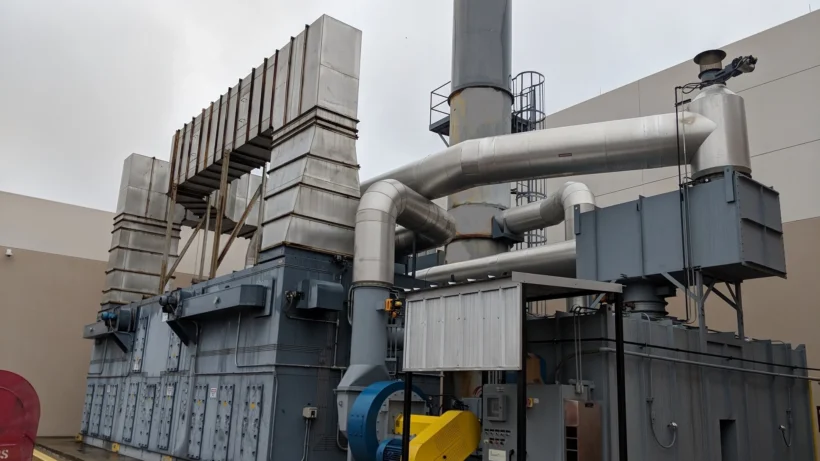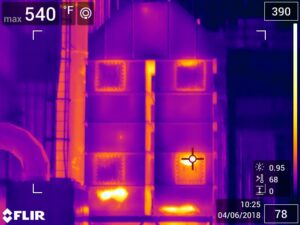Regenerative Thermal Oxidizers (commonly referred to as RTOs) are industrial air pollution control systems that can offer significantly lower operating costs compared to other emission control technologies when used in the right application. However, timely inspections, preventative maintenance (PM), repairs, and upgrades of existing RTOs are essential to ensure high reliability and lower cost of ownership, as well as for compliance with increasingly stringent air permits.
Comprehensive upkeep and routine upgrades fight the system degradation that can occur over time so that your application isn’t negatively affected by reduced treatment efficiency and effectiveness. (Learn how an RTO works.)
Our team of field-tested technicians and engineers are highly experienced with all makes and models of RTOs, not just a specific manufacturer’s. What’s more, they’re specifically trained to go beyond presenting mechanical problems to troubleshoot underlying issues common to certain oxidizer systems and industrial applications. As a result, you receive the best solution for your unique oxidizer system, application, and pain points – so your RTO operates more reliably and cost-effectively long term. Your production stays up and you stay compliant.
Our experienced field engineers and technicians are well trained and equipped to service, repair and/or upgrade your existing Regenerative Thermal Oxidizer and Concentrator. Some of the more common issues PolSys Services addresses related to rto maintenance include:
• Cleaning RTO media or oxidizer catalyst
• Replacing RTO media or oxidizer catalyst
• Replacing or Upgrading Burners and Gas Trains
• Diverter Valve repairs (Read our Poppet Valve Assembly Case Study)
• Corrosion control and structural repairs
• Duct replacement and flow restrictions
• Concentrator repairs and services
• Troubleshooting or upgrading operating controls including the operator interface, programmable controllers, and valve drives
• Tuning and re-programming existing software programs and upgrading system controls. (If you’re operating with outdated controls, you could be operating at a major
disadvantage.)

A Regenerative Thermal Oxidizer (RTO) is a proven type of air pollution control equipment used to destroy Volatile Organic Compounds (VOCs) and Hazardous Air Pollutants (HAPs) found in industrial exhaust streams. Here’s how they work, why they’re so popular, and common maintenance issues.
Our field service technicians have extensive experience repairing and replacing all types of RTO diverter valves to guarantee that your system is operating properly and that you remain in compliance.
We repair what the other company “fixed.”
When compared to other air pollution control technologies, Regenerative Thermal Oxidizers can offer many known advantages (especially high thermal efficiency), but it is important for facility managers to understand lesser-publicized maintenance drawbacks. For example, RTOs include a variety of moving parts and hardware which require proper monitoring and preventative maintenance. Burners must be accurately tuned, and diverter valves must be regularly checked to ensure they seal tightly. Ceramic media often becomes plugged over time, greatly decreasing system performance.
To ensure high reliability/uptime, consistently high destruction removal efficiencies (DRE), and low cost of ownership, these oxidizers must be carefully maintained by technicians who understand the equipment, including its control system. (We have encountered many RTOs where incorrect programming of controls to “overcome” a system issue has caused major performance and compliance issues.)
When employed in the correct application and properly maintained, RTOs can offer relatively low operational costs and good uptime. However, due to their numerous moving parts, there are many potential points of failure, and it is recommended that an RTO be inspected at least once a year by an oxidizer specialist to prevent unplanned downtime. Older RTOs should be inspected semi-annually at a minimum.
Special areas of concern include:

Thermal Imaging Available
Our thermal imaging cameras translate thermal energy (heat) into visible light in order to analyze air pollution control equipment. These cameras are ideal for RTO system diagnostics, as they help determine the condition of key components like insulation or refractory in an oxidizer, or the machine health of fans, pumps, and motors. Hot spots show areas of weakness or damage so these issues can be addressed, reducing auxiliary fuel costs, avoiding more costly repairs in the future, and preventing downtime.
Concerned your RTO may not be operating with minimum efficiency and that your plant may be out of compliance with your air permit? See our Tips for Troubleshooting Your RTO before a Stack Test, and/or contact us for a nonreportable pre-compliance test.
For maximum system reliability and production uptime, many of our customers with RTOs choose a Rapid Response Service Agreement. Plans are tailored to your needs and include routine and scheduled inspections, a set number of emergency call-outs per year with a guaranteed maximum response time, onsite preventative maintenance (PM) training for staff, telephone technical support, controls assessments, and much more. If your facility is operating at or near capacity, these agreements can pay for themselves many times over in increased system reliability, safety, and compliance.
Regardless of the issue you would like to address, our experience and knowledge of all types of air abatement technologies and processes allow us to assess your situation and quickly address any needed equipment repairs and upgrades. Contact PolSys Services today to discuss your repair/upgrade needs.